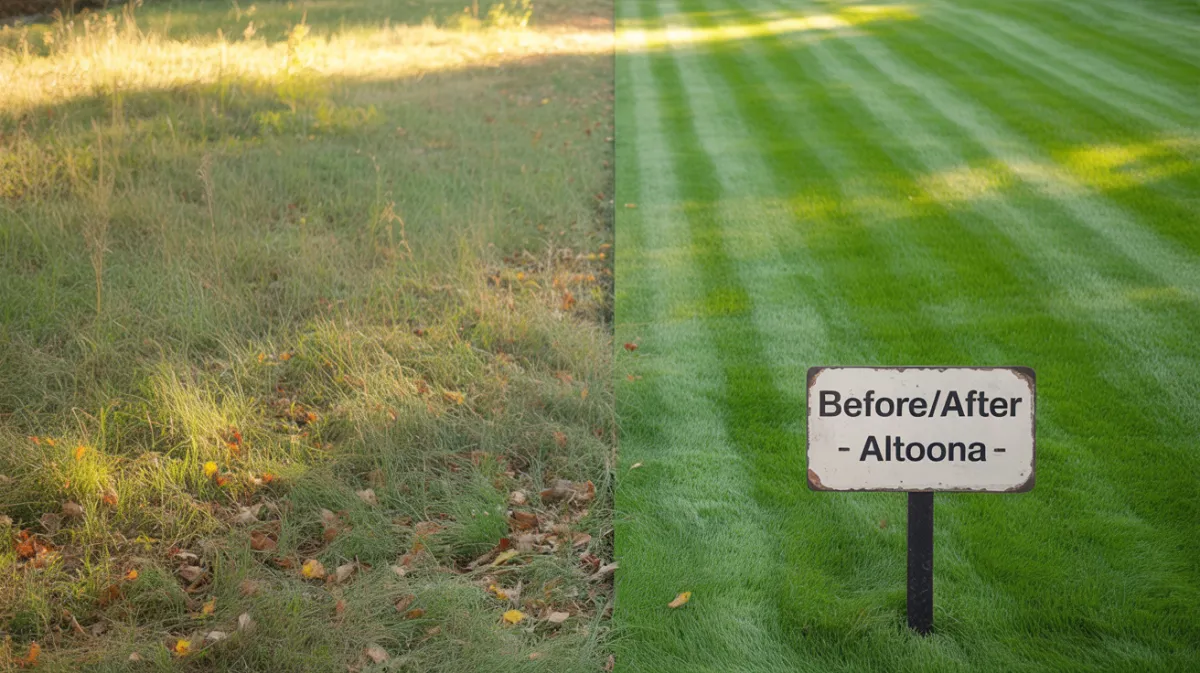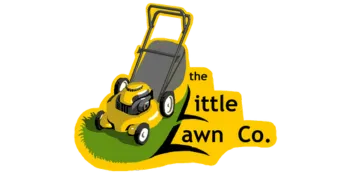Our Blog

Fall Grass Cutting in Altoona PA: Why October Matters More Than You Think
Fall Grass Cutting in Altoona PA: Why October Matters More Than You Think
Most Altoona homeowners make the same costly mistake every fall: they stop mowing too early.
The leaves start falling, temperatures drop, and that trusty mower gets put away for the season. It seems logical. After all, grass grows slower in October, right?
Here's what most Blair County residents don't realize: October is actually the most important month of the entire year for your lawn's health.
While grass blade growth does slow down as temperatures cool, something critical is happening underground. Your lawn is working harder in October than any other month to prepare for next spring's success.

Why Cool-Season Grass Loves October in Blair County
Pennsylvania lawns are dominated by cool-season grasses like Kentucky bluegrass, tall fescue, and perennial ryegrass. These aren't your typical warm-weather plants. They evolved to thrive in cooler temperatures, and October's weather in Altoona creates perfect growing conditions.
Here's the science: When October brings us those beautiful 61°F days and crisp 42°F nights, your grass shifts its energy production underground. Instead of pushing out new blade growth, it's:
Building extensive root systems that dig deeper into Blair County soil
Storing carbohydrates in roots and crowns for winter survival
Strengthening its foundation for aggressive spring growth
Preparing defenses against winter diseases and stress
At Altoona's elevation (1,165 to 1,480 feet) in USDA Zone 6b, we experience these ideal conditions for about three to four weeks every fall. Miss this window by stopping lawn care too early, and your grass enters winter unprepared.
Our complete Blair County lawn care calendar explains seasonal timing for every month of the year. Read it here : https://thelittlelawnco.com/blog/b/blair-county-lawn-care-calendar-2025
The October Timeline: What's Really Happening on Your Lawn
Early October (First Week): Your lawn is still actively growing. The average first frost doesn't arrive until October 15 in Altoona, and grass keeps growing well after first frost. Daytime temperatures remain warm enough for photosynthesis and carbohydrate production.
Mid-October (Week 2-3): This is the critical window. Soil temperatures hover between 50-65°F—the sweet spot for root development. Your grass is storing energy like a bear preparing for hibernation. Consistent mowing during this period ensures maximum photosynthesis and carbohydrate storage.
Late October (Week 4): Blade growth slows noticeably, but roots continue developing. The growing season typically extends until late October or early November. This final phase of carbohydrate storage makes the difference between a lawn that merely survives winter and one that thrives come spring.

What Happens When You Stop Mowing Too Early
Think of October lawn care as your grass's retirement account. Skip these final weeks, and your lawn enters spring financially broke:
Shallow root systems: Without October's root development period, your grass has weak, shallow roots. Come next summer's heat, these shallow roots can't access deep soil moisture. Result? Brown patches and stressed turf.
Depleted energy reserves: Grass that doesn't store adequate carbohydrates in fall starts spring at a disadvantage. It greens up slowly, grows weakly, and struggles through spring stress periods.
Increased disease susceptibility: Snow mold and other winter diseases hit hardest on lawns that entered dormancy with insufficient carbohydrate reserves. Your grass simply lacks the energy to resist pathogens.
Weak spring recovery: Ever notice how some lawns green up vigorously in April while others look patchy and thin? That difference was determined the previous October.
The contrast is stark. Professional lawn services see this every spring: properties that received consistent October care burst to life in April with thick, vigorous growth. Neglected lawns wake up slowly, thin, and vulnerable to weeds that colonize bare patches.

Proper Fall Grass Cutting: Height Adjustments Matter
October mowing isn't just about frequency—height adjustments play a crucial role too.
Early October: Continue mowing at your summer height of 3.5-4 inches. This height protects root systems and maintains maximum leaf surface for photosynthesis during the carbohydrate storage period.
Mid to Late October: Gradually reduce cutting height to 2.5-3 inches for the final mowing of the season. This gradual reduction prevents shock while ensuring grass enters winter at an appropriate height.
Why this matters: Grass that's too tall entering winter can mat down under snow, creating perfect conditions for snow mold. Grass cut too short lacks sufficient leaf surface to maintain health through winter. The gradual reduction strategy balances both concerns.
The Leaf Management Challenge
October in Blair County means falling leaves, and how you handle them directly impacts your lawn's October development.
Leaves left on your lawn block sunlight—the fuel source for photosynthesis and carbohydrate storage. A thick layer of leaves prevents your grass from completing its critical October work. Within just one week, a heavy leaf layer can significantly reduce the carbohydrate storage your lawn achieves.
The solution isn't complicated, but it requires consistency:
Weekly removal during peak leaf fall: This keeps your lawn exposed to sunlight for maximum photosynthesis. The Little Lawn Co. integrates leaf management with regular mowing schedules, ensuring leaves never accumulate long enough to block critical October growth.
Mulching when appropriate: Light leaf layers can be mulched with regular mowing, returning nutrients to soil while maintaining grass access to sunlight.
Learn everything about professional leaf removal services and timing in our complete fall cleanup guide.

Why Professional Service Makes Sense in October
Here's an honest assessment: October lawn care is uncomfortable. Mornings are cold, leaves are wet, and that cozy couch looks mighty appealing on Saturday afternoon.
But skipping October maintenance means sacrificing next year's lawn quality. Professional lawn care solves this timing problem.
The Little Lawn Co. has maintained consistent October service for Blair County homeowners since 2017. Our 7-time award-winning team (Best Lawn Care Service Provider, 2019-2025) understands the science behind fall lawn care and the specific needs of Altoona's climate.
We adjust our schedule to match grass growth patterns, not calendar dates. When October temperatures remain mild and grass keeps growing, we keep mowing. When growth finally stops in late October, we complete that crucial final cut at appropriate height.
Get your free quote and experience the difference award-winning October service makes for next spring's lawn quality.
Learn exactly how much professional lawn care costs in Blair County and why it's worth every penny.
The Spring Payoff: What Proper October Care Creates
Lawns that receive consistent October care enter spring with distinct advantages:
Vigorous early green-up: Stored carbohydrates fuel rapid chlorophyll production and early growth. Your lawn greens weeks earlier than neglected properties.
Dense, thick turf: Fall root development creates tillering (new shoot production) that makes lawns naturally thicker. This density crowds out weeds before they can establish.
Better stress tolerance: Deep roots and high carbohydrate reserves help your lawn handle spring's variable weather—late frosts, early heat waves, and heavy rains that challenge weak lawns.
Reduced spring renovation needs: Thick, healthy lawns don't need aggressive overseeding or bare patch repair. The lawn maintained itself through proper fall care.
Think of it this way: every dollar and hour invested in October lawn care saves three to five times that investment in spring recovery work. The math is simple, and the results are visible every April.
Common October Lawn Care Mistakes to Avoid
Mistake #1: Winterizing equipment too early Altoona's November weather often produces warm spells that trigger one more growth surge. Don't fully winterize your mower until grass shows complete dormancy, typically by Thanksgiving.
Mistake #2: Skipping fall fertilization Many homeowners fear late-season fertilizer promotes excessive growth that weakens grass. Research proves otherwise. Slow-release nitrogen applied in October supports carbohydrate storage and root development without stimulating vulnerable blade growth.
Mistake #3: Waiting for spring aeration Fall aeration (late August through early October) proves superior for cool-season grasses. Fall timing avoids bringing weed seeds to the surface and allows immediate benefit to October root development.
Mistake #4: Assuming grass has stopped growing Grass growth doesn't cease until daytime temperatures consistently remain below 50°F. In Altoona, this typically occurs in late October or early November. Visual appearance can be deceiving—blades slow down while roots accelerate.
Your October Action Plan for Blair County Lawns
If you're handling lawn care yourself this October, here's what needs to happen:
Week 1-2 (Early October):
Continue regular mowing at 3.5-4" height
Remove leaves weekly or more frequently during heavy leaf fall
Consider core aeration if not completed in September
Apply slow-release nitrogen fertilizer (if not already done)
Week 3-4 (Mid to Late October):
Begin gradually reducing mowing height toward 2.5-3"
Maintain weekly leaf removal
Monitor grass growth rate—mow when needed, not by calendar
Prepare for final mowing when growth stops
Final Mowing (Late October/Early November):
Cut to 2.5-3" height for winter
Ensure all leaves are removed
Clean and store equipment properly
Take satisfaction in knowing your lawn is set up for spring success
Or skip the cold mornings and weekend work entirely by letting Altoona's 7-time award-winning lawn care team handle it. Starting at just $36.05 per week, The Little Lawn Co. provides consistent October service that protects your spring investment.

The Bottom Line: October Is Your Lawn's Most Important Month
Here's what seven years of professional lawn care in Blair County has taught us: the lawns that look best in May had the best care in October.
Spring is too late to fix winter damage. Summer is too late to correct thin turf. Fall—specifically October—is when next year's lawn quality is determined.
Altoona's unique climate creates a narrow but critical three-to-four-week window where cool-season grass completes the work that determines its success for the following year. That window is happening right now.
Your lawn is either building the deep roots and energy reserves it needs to thrive, or it's entering winter unprepared. The choice—and the timing—is critical.
Ready to Set Up Your Lawn for Spring Success?
The Little Lawn Co. has given Blair County families their weekends back since 2017. As Altoona's 7-time award-winning lawn care service, we understand the science behind October lawn care and the specific needs of your property.
Contact us today for a free quote:
📞 Call: 814-422-LAWN (5296)
🌐 Visit: thelittlelawnco.com
📍 Serving: Altoona, Hollidaysburg, Duncansville, Bellwood, Tyrone, and all of Blair County
Don't let another October pass without giving your lawn the care that determines next spring's success. Your future lawn is counting on the decisions you make this month.
About The Little Lawn Co.
Family-owned and operated since 2017, The Little Lawn Co. is honored to be recognized as Altoona's premier lawn care provider for 7 consecutive years (2019-2025). We believe in providing exceptional service at fair prices while respecting both our customers and our community. Our Pay-4-Performance model ensures quality on every visit, and our deep knowledge of Blair County's unique climate means your lawn receives care specifically designed for local conditions.
Get Your Weekends Back!
Professional weekly service starting at $36 | Award-winning quality | Serving Altoona and surrounding areas

Follow Us!
©The Little Lawn Co 2025 All Rights Reserved.
